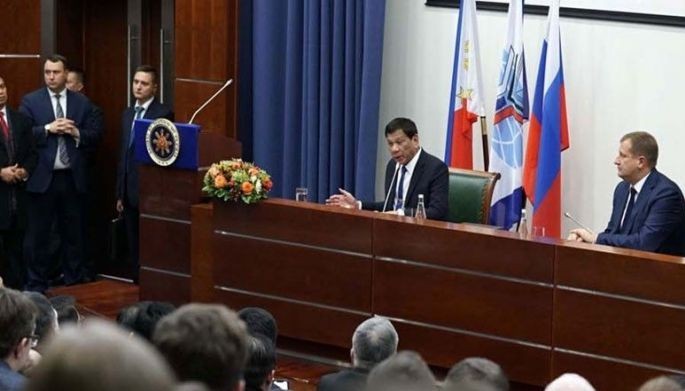MOSCOW – President Duterte has stressed the need for the Philippines and the rest of the world to address the issues hounding the environment and the impact of climate change.
In his speech during the conferment of an honorary doctorate degree for international relations at the prestigious Moscow State Institute of International Relations University, the Chief Executive said climate change is already threatening the very survival of the planet.
“Disruptive weather patterns with stronger intensities deliver punishing blows on our archipelagos like the Philippines year-in and year-out. It is aggravating existing divides within and between nations and even as it creates new ones. Hence, we have to work together to find solutions that are effective, fair and beneficial to everyone,” Duterte said in his speech last Saturday.
It was not known why Duterte shifted his views on the issue of climate change. He has been blaming developed nations for their respective economies’ role in the deteriorating conditions of the environment.
He also previously said that climate change agreements are favorable only to rich countries, that industrial countries are responsible for causing the warming of the globe and that the Philippines is one of the victims.
From his favorite novel in high school to his political career and steering the country’s foreign policy to a different route, Duterte comfortably worked his way into the minds of the young Russians who are studying international relations.
He discussed how terrorism has become a threat to the people of the world and the ill effects of drugs.
“As our world shrinks, our societies will become more and more vulnerable to threats that transcends boundaries. Terrorism and violent extremism, drug trafficking and other transnational crimes are all those that will be prevailing dangers for your generation and for the next, and maybe in all time. They threaten our security, destroy the fabric of our society and endanger the future of our youth from hereon,” Duterte said.
As he batted for forging new alliances with non-traditional allies, Duterte reiterated his call on allies not to set pre-conditions to grants.
“Common threats make us one, (it) should be enough to bring us together. Unfortunately, do I have to mention the country? I’m tempted to. It’s on the tip of my tongue. This might blow up my plane going home. Again, what is required is open and genuine cooperation without political preconditions. And a lot of the West are doing it. If I have to enumerate one by one, I may not be able to finish my speech. I’ll just lose the enthusiasm,” he said.
He added that many choose divisiveness instead of inclusiveness in the belief that “theirs is the best way to approach the world. And more importantly, an enfeebled global order.”
“What is laughable is that the same countries blame others for the state of affairs. They lament the pushback against liberal universalism, from perceived authoritarian leaders, like me, and a handful of others in your region and in my region. What they do not realize, or just cannot accept, is that their unilateralist exploits (are) driven by exceptionalism,” Duterte said.
Back in Manila, presidential spokesman Salvador Panelo said the Palace considers the last working day of Duterte’s official visit to Russia special and significant.
First, Panelo said it was the first time for the Chief Executive to receive and accept an honorary degree. Second, it was a welcome opportunity for Duterte to touch base and bond with members of the Filipino community in Russia who came from various parts of the country just to have a glimpse of the President.
“The President stressed that he continues to chart an independent foreign policy course which promotes respectful friendships and partnerships, as well as meaningful cooperation and which enhances the interests of the Philippines,” he said.
He added that Duterte also talked about “our country’s partnerships with traditional allies, such as the US, remain important much as he recognizes the importance of ASEAN centrality and unity.”
As chief architect of foreign policy, Duterte noted that the country’s overdependence on traditional partners in the past “has limited our room to maneuver when faced with significant matters in a time when the global balance of power is shifting from West to East.”
“He thus made sure to correct this strategic oversight to seize the opportunities of this current evolving order. This explains the raison d’etre for the reinvigoration of diplomatic ties between the Philippines and Russia, which is now bearing fruit three years after (Duterte) adopted such policy,” Panelo explained.


